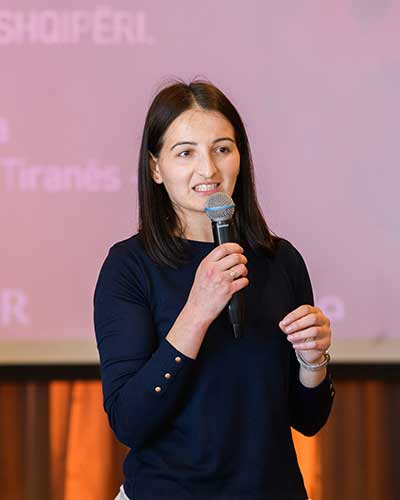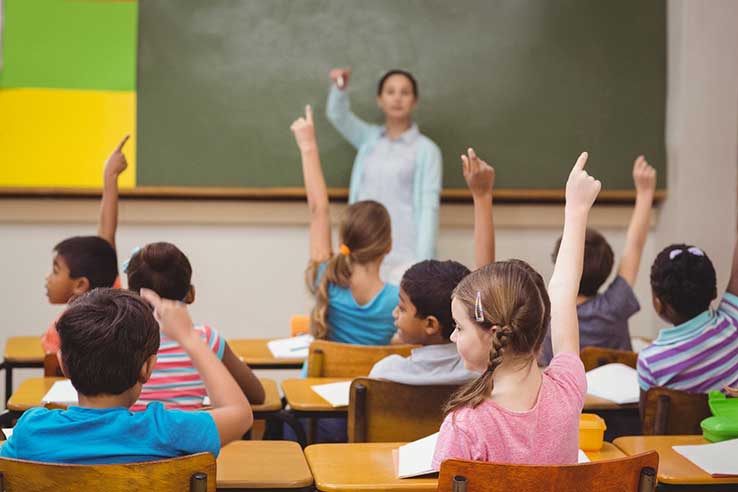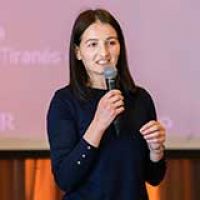The blog is published as part of the international symposium “Keeping up the Pace: Media Literacy Education in an Accelerating Age” organized by the Institute of Communication Studies on February 3 – 4, 2022. Register to follow the event on this link.
Dorentina Hysa

The repetitious exposure to excessive information creates the ground for lies to become truths. We struggle to tell what is true and what is not. In an ocean of content where practically anyone can publish, it becomes harder to swim without proper training.
When was the last time you gained a new skill? The timing itself might be as crucial as the reasons that ‘forced’ you to develop that particular skill. As human beings, we tend to develop skills and competencies that are useful to us on an individual and societal level. We develop those skills to handle the demands and challenges of everyday life. The list of life skills changes gradually, following the latest developments that happen around us. In that list, we need to include media and information literacy. But why is that?
The reach of mass media has never been as massive as it is today. We encounter, give, and receive, tons of information daily from different sources. So do children, teenagers, students, and other adults. Constantly, we are consuming content through our mobiles, PCs, television, books, social media, etc., be those written, spoken, or visualized. We are surrounded by media and information in all forms and means.
The risks of being media and information illiterate
The exposure to such a variety of information makes us fragile towards it, considering that it comes packed with bias, manipulation, propaganda, fake news, hate speech, all sorts of intentions that the author/s might have. Think of the biased information and marketing techniques which in one way or another influence our buying habits, unconsciously. Or the information manipulation spread through the media that hinders the truths and creates distorted realities.
The information disorders (misinformation, malinformation, and disinformation) create confusion and misunderstanding about social and political issues. Fake content affects people’s physical and psychological health just because someone on the internet decided to publish something to get more clicks without caring about the consequences.
Our repetitious exposure to excessive information creates the ground for the lies to repeat often enough until they become the truths. We struggle to tell what is true and what is not, what to believe and what not? In a world where practically, anyone has the opportunity to publish it becomes harder to swim without proper training. To be able to save ourselves from drowning in this sea of media and information, we need to gain basic skills and competencies. We need to learn and teach how media and information work. What techniques are used, by whom, and with what intention? We need to develop critical thinking skills, and MIL can be helpful in this regard.
Increasing MIL through education
A promising approach to developing MIL literate citizens is through education, including formal, non-formal, and informal. While formal education takes place in educational systems, such as schools and universities, non-formal education happens outside these formal learning environments, typically in community settings (with a learning outcome in mind).
On the other hand, informal learning is experiential learning, and as such incidental. In Albania, informal and non-formal education for MIL is mostly covered by the civil society organizations, however considering that the CSOs operate in terms of projects their contribution is short-term, restricted in terms of reach, and not sustainable.
On the other hand, formal education has been limited mostly to ICT use in schools and some general media education, nevertheless, that does not fill the existing needs to educate generations who are media and information literate. In a background study that was done in 2020 by the Albanian Media Institute on MIL strategies and policies in Albania, the results show a lack of MIL inclusive approach in formal, non-formal, and informal education. Here and there, there were elements of media education or ICT but not MIL per se. MIL is a new term that is eventually gaining attention and that is a good start to a long challenging journey.
Piloting MIL in pre-university education in Albania
With the support of different donors, which have given priority to media and information literacy, the attention, and actions towards MIL in the last couple of years have been increased. UNESCO for example, in the framework of the Project “Building Trust in Media and Southeast Europe and Turkey, Phase II”, is supporting MIL curricula incorporation in the formal education system in Albania.
This is the first time that MIL as a composite term is being used in pre-university education in our country. With the cooperation of the Ministry of Education and Sports and ASCAP, 20 schools were selected to be part of the piloting phase. In the first phase of piloting in 10 secondary schools during 2021, 120 teachers were trained to implement the curricula and around 8546 pupils of grades 6th to 9th had the opportunity to familiarize themselves with MIL.
 Source: freepik.com
Source: freepik.com
The process of piloting was not easy, and challenges were encountered. These challenges were related to the school’s infrastructure (e.g. internet connections, libraries, computer labs, etc.); teachers being overloaded; classes having a large number of pupils, and the pandemic circumstances. As per the MIL curricula itself, in the beginning, it raised questions and insecurities amongst teachers but that was improved with the training and mentoring offered during the piloting.
Ten mentors were assigned to supervise trained teachers that incorporated MIL in their respective subjects. The feedback gathered from them shows that the teachers use MIL in the classroom in three levels: to find additional information, to incite higher thinking skills and to express/create content creatively.
Teachers expressed that being trained on MIL and piloting was beneficial on a personal and professional level. Pupils gained a new perspective on media and information which has been reflected in all the subjects (e.g. they ask challenging questions, use different sources to compare information, and go beyond just reproducing content by analyzing it).
In a nutshell, it has stimulated pupils to improve their learning process, to make the classes more inclusive, and incite their critical thinking skills. MIL in formal education has another added value It challenges the traditional ways of teaching where pupils are considered somehow as “empty vessels” that are in school to be filled with information. On the contrary, MIL considers both teachers and pupils as active contributors to the teaching-learning process. Through MIL the efforts are to teach pupils “how” to think and not “what” to think.
The patterns of thinking, reasoning, and behaving start to develop quite early in life, following a gradual shift from simple patterns to the most complex ones. However, the environment can foster or impede their development. The same applies to Media and Information Literacy. If it is not intervened early on, the results can be devastating to the entire society.
The age of exposure to media and information decreases year after year, and with its decrease, our concerns should increase. MIL is a critical life skill and as such, it should be developed as early as possible through all stages of education.
Please refer to the Terms before commenting and republishing the content.
Note: The views and opinions expressed in this article are those of the author and do not necessarily reflect the views of the Institute of Communication Studies or the donor.


